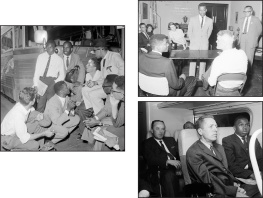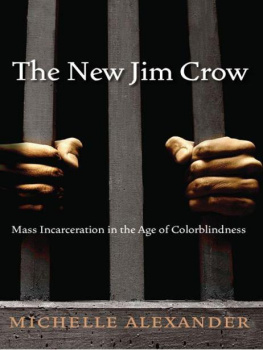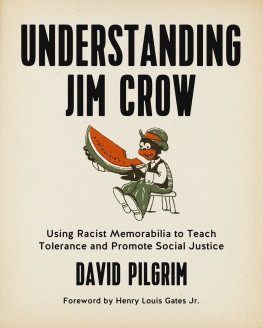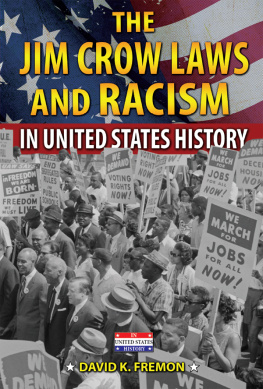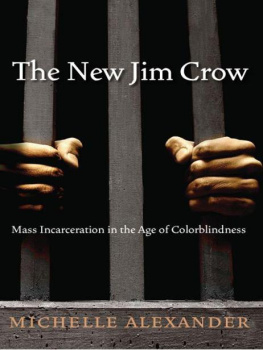FREEDOM RIDERS
ALSO BY RAYMOND ARSENAULT
The Wild Ass of the Ozarks:
Jeff Davis and the Social Bases of Southern Politics
St. Petersburg and the Florida Dream, 18881950
Crucible of Liberty: 200 Years of the Bill of Rights (Editor)
The Changing South of Gene Patterson: Journalism and Civil Rights, 19601968 (Coeditor with Roy Peter Clark)
Paradise Lost? The Environmental History of Florida
(Coeditor with Jack E. Davis)

PIVOTAL MOMENTS IN AMERICAN HISTORY
Series Editors
David Hackett Fischer
James M. McPherson
James T. Patterson
Brown v. Board of Education:
A Civil Rights Milestone and Its Troubled Legacy
Maury Klein
Rainbows End: The Crash of 1929
James McPherson
Crossroads of Freedom: The Battle of Antietam
Glenn C. Altschuler
All Shook Up: How Rock n Roll Changed America
David Hackett Fischer
Washingtons Crossing
John Ferling
Adams vs. Jefferson: The Tumultuous Election of 1800
Joel H. Silbey
Storm over Texas:
The Annexation Controversy and the Road to Civil War
FREEDOM RIDERS
1961 and the Struggle for Racial Justice
RAYMOND ARSENAULT


Oxford University Press, Inc., publishes works that further Oxford Universitys objective of excellence in research, scholarship, and education.
Oxford New York
Auckland Cape Town Dar es Salaam Hong Kong Karachi
Kuala Lumpur Madrid Melbourne Mexico City Nairobi
New Delhi Shanghai Taipei Toronto
With offices in
Argentina Austria Brazil Chile Czech Republic France Greece
Guatemala Hungary Italy Japan Poland Portugal Singapore
South Korea Switzerland Thailand Turkey Ukraine Vietnam
Copyright 2006 by Raymond Arsenault
Published by Oxford University Press, Inc.
198 Madison Avenue, New York, NY 10016
www.oup.com
Oxford is a registered trademark of Oxford University Press
All rights reserved. No part of this publication may be reproduced, stored in a retrieval system, or transmitted, in any form or by any means, electronic, mechanical, photocopying, recording, or otherwise, without the prior permission of Oxford University Press.
Library of Congress Cataloging-in-Publication Data
Arsenault, Raymond.
Freedom riders : 1961 and the struggle for racial justice / Raymond Arsenault.
p. cm. (Pivotal moments in American history)
Includes bibliographical references and index.
ISBN-13: 978-0-19-513674-6
ISBN-10: 0-19-513674-8
1. African American civil rights workersHistory20th century.
2. Civil rights workersUnited StatesHistory20th century.
3. African AmericansSegregationSouthern StatesHistory20th century.
4. Segregation in transportationSouthern StatesHistory20th century.
5. African AmericansCivil rightsSouthern StatesHistory20th century.
6. Civil rights movementsSouthern StatesHistory20th century.
7. Southern StatesRace relationsHistory20th century. I. Title. II. Series.
E185.61.A69 2006 323.097509046dc22 2005018108
9 8 7 6 5 4 3 2 1
Printed in the United States of America
on acid-free paper
For
John Hope Franklinthe Freedom Writer
Parts of this book previously appeared in a different form and are republished with permission: You Dont Have to Ride Jim Crow: CORE and the 1947 Journey of Reconciliation, in Before Brown : Civil Rights and White Backlash in the Modern South, ed. Glenn Feldman, 2167 (Tuscaloosa: University of Alabama Press, 2004); You Dont Have to Ride Jim Crow, Stetson Law Review 34 (Winter 2005): 343411; One Brick at a Time: The Montgomery Bus Boycott, Nonviolent Direct Action, and the Development of a National Civil Rights Movement, in Sunbelt Revolution: The Historical Progression of the Civil Rights Struggle in the Gulf South, 18662000, ed. Samuel C. Hyde Jr., 153189 (Gainesville: University Press of Florida, 2003); and Taking the Road to Freedom, Forum 28 (Spring 2004): 3035.
Contents
Maps
Editors Note
MANY AMERICANS who were alive on May 4, 1961, will remember the Freedom Riders. On that day, thirteen activists climbed aboard buses in Washington, with tickets for New Orleans. Their purpose was to challenge racial segregation in interstate travel, which the Supreme Court had declared an unconstitutional violation of human rights.
They had little trouble in Virginia and North Carolina, but as the buses rolled deeper into the South, the hostility increased. In South Carolina, the beatings began. In Georgia, Martin Luther King met them and warned, You will never make it through Alabama. He had learned of a conspiracy by the Ku Klux Klan, the police, and local officials to stop them by brute force. The Freedom Riders pressed on with great courage, even as they knew what lay ahead. In Anniston, Alabama, one bus was stopped and set ablaze. As the Freedom Riders ran from the smoke and flames, a mob tried to murder them, while other southerners sought to save them. The other bus reached Birmingham, and the Freedom Riders were dragged off and beaten nearly to death.
These savage scenes were recorded by journalists and photographers, who were attacked as viciously as the Freedom Riders themselves. Their reports flashed around the world and inspired hundreds of Americans to make more than sixty Freedom Rides through the Deep South in 1961, which brought out more mobs and caused more violence.
The images of these events remain fresh and vivid, but the history has grown faint and hazy, and much of it was never understood. Scarcely anyone remembers the story as it actually happened. Now at last we have the first full-scale book on the Freedom Riders, by a professional historian. Raymond Arsenault is one of the most gifted scholars of his generation. He has devoted many years of deep research to this subject.
The result is truly a definitive work, which draws on unpublished writings of Freedom Riders that have never been used before. The author has also studied the papers of their mortal enemy Bull Connor, their dubious friends in Washington, John and Robert Kennedy, and forty other manuscript collections. Much of the book is based on more than two hundred personal interviews of participants, the records of more than two dozen court cases, and many film, video, and sound recordings.
The author has brought together these materials with consummate skill. He also has a southern gift for story-telling. From the moment when the Freedom Riders climb aboard the bus, his narrative carries the reader along with an intensity and pace that few works of fiction are able to achieve.
The story is full of surprises. We meet the Freedom Riders as individuals, 436 of them in a fascinating appendix which is in itself a major contribution. They were very diverse. No novelist could have invented Albert Bigelow, a retired captain in the U.S. Navy who became a Quaker, a pacifist, and a Freedom Rider; or Walter Bergman, a retired teacher from Michigan and a Norman Thomas socialist; or Genevieve Hughes, a beautiful young woman who worked on Wall Street at Dun and Bradstreet and was a capitalist with a social conscience. All three were severely wounded on the first Freedom Ride.
Next page


